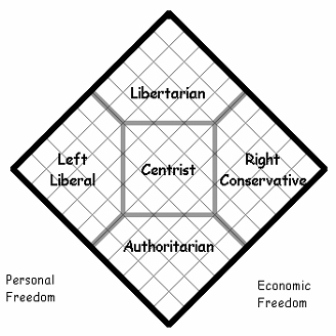CURRENT AFFAIRS
Is Christianity compatible with Libertarianism?
By CG

Political libertarianism doesn't regard man in relation to God, but man in relation to man in the realm of society. Libertarianism argues that for human society to thrive personal freedom must be maximized and government control must be minimized. Put another way, the more control government has over the lives of the citizenry, the less free the people are. The less free the people are, the less prosperous the society as a whole will be. History bears this out to be true. The most prosperous civilizations have been those that maximized personal freedom and kept government intervention to a minimum.
Political libertarianism operates on a principle called the non-aggression principle. The principle of non-aggression states that it is unethical for a party to initiate aggression against another's person or property through violence, theft or fraud. Stated positively, a person has the right to life, liberty and property. As such, he is free to do what he wishes as long as he doesn't infringe on another's right to life, liberty and property. Libertarianism also favors free market capitalism as the best way to achieve a prosperous society in which people are allowed to freely trade goods and services as well as make mutually agreed upon contracts. As far as the role of government is concerned, government exists solely to protect the rights of individuals and to protect the country as a whole against aggression. The main libertarian objections to government in general is that governments tend to want to perpetuate their hold on power and can only survive on taxation; which can be argued is a violation of the non-aggression principle (taxation being a form of legalized theft).
That's all well and good, but what about the social conservatism that marks many Christians (including myself)? How can Christianity, with its strict definitions of sin and its prohibitions against such, be compatible with libertarianism? That's a good question, and one I struggled with for some time. As a Christian, I have strong views on abortion, homosexuality, substance abuse and other forms of immorality.
The question I had to ask myself as I studied the issue further is this: Is it right for Christians to force their morality on the nation as a whole through the power of the government? Put another way, is it right for the government to coerce people to follow a moral code with which they don't agree? With the exception of abortion, I cannot make an argument on libertarian grounds in favor of legislating against the immoral behaviors listed above. There is no reason, on libertarian grounds, to prohibit two homosexuals to "marry." Additionally, there is no reason, on libertarian grounds, to protect special rights and privileges for heterosexual marriage and withhold them from homosexual relationships. The same can be said for legalizing marijuana, gambling, prostitution, etc. If anything, the libertarian arguments for legalizing marijuana, gambling and prostitution are very strong given our history with the prohibition of alcohol.
Here is where my social conservative friends would say to me: "By legalizing this immoral behavior, aren't you giving your tacit approval for said behavior? Also aren't you afraid of societal decay?" After careful consideration, my answers are "no" and "yes" respectively. Libertarianism is all about freedom and liberty, not about legalizing marijuana. Hand in hand with liberty is tolerance for how others decide to use their liberty. I do not approve of marijuana use, gambling or prostitution; all are prohibited in the bible. But I believe freedom is a principle that is more beneficial than legislating a particular moral code. If we value freedom, then we must allow people the ability to abuse that freedom in self-destructive or immoral ways. Tolerating homosexuality is not the same as condoning it; and in a free society, I would have the freedom to speak out against the sin of homosexuality, while at the same time tolerating my homosexual neighbor. In regards to societal decay, there is a chance that permitting such immoral behavior would lead to societal decay; but we're already witnessing societal decay. And as with alcohol prohibition, the prohibitions against marijuana use, gambling, etc., haven't prevented people from performing said behaviors. Plus, as with alcohol prohibition, to the extent that drug, gambling and prostitution are illegal, there will always be an organized criminal element involved. The unintended consequences of prohibition are devastating in money spent, lives lost, civil rights violated and property stolen or damaged.
As Christians, we know that the law does not justify; the law can only condemn. We are justified by grace alone through faith alone in Christ alone. The point being, enforcing a biblical morality on society isn't going to make society righteous. That only comes through faith in Christ. The unbelieving mind is inherently hostile to the things of God. The means Christians would use to enforce a biblical morality are the same means the enemies of Christ would use to persecute Christianity. However, in a truly libertarian society, Christians would be free to practice their faith as they see fit and the church would be free to be the church! And as we all know, true freedom is found in Christ and Christ alone!
comments powered by Disqus
Published on 2-21-12

